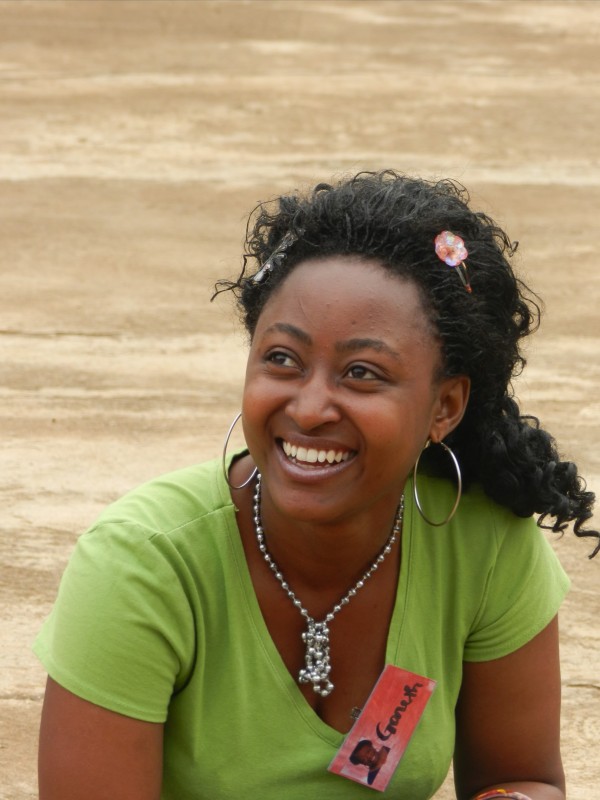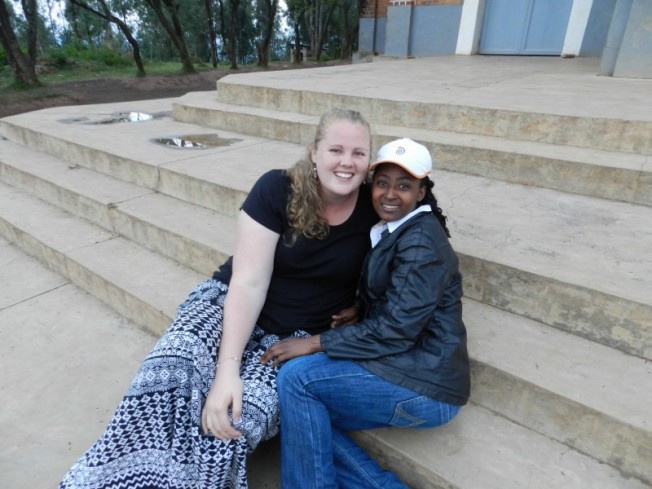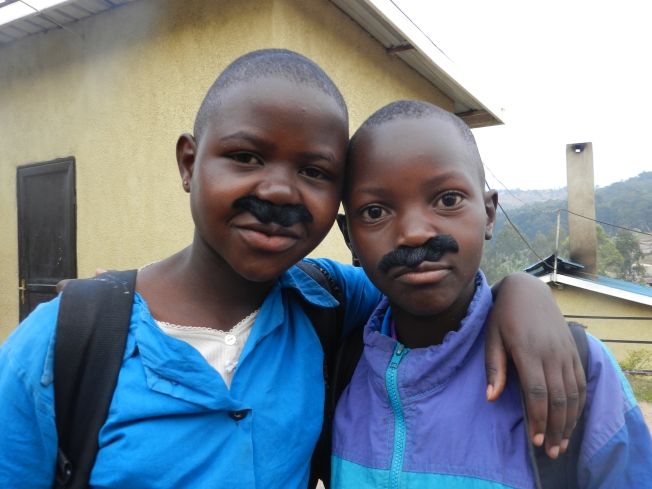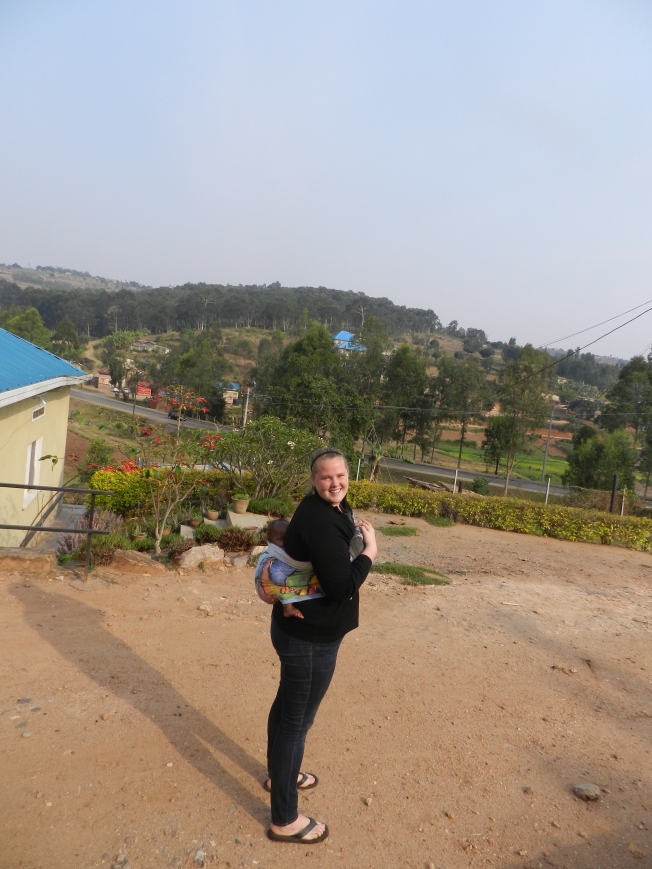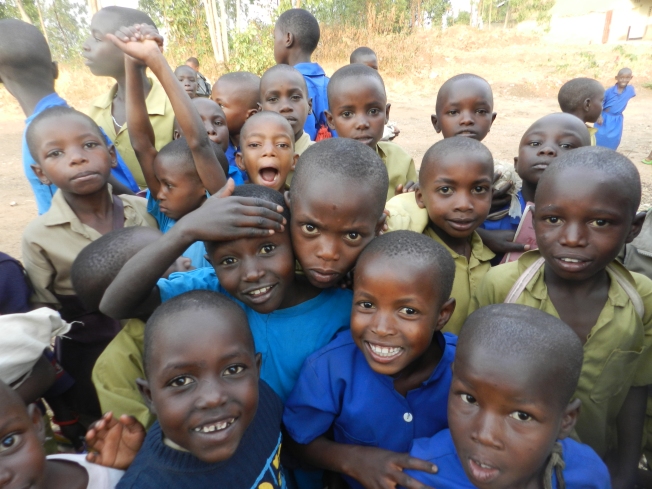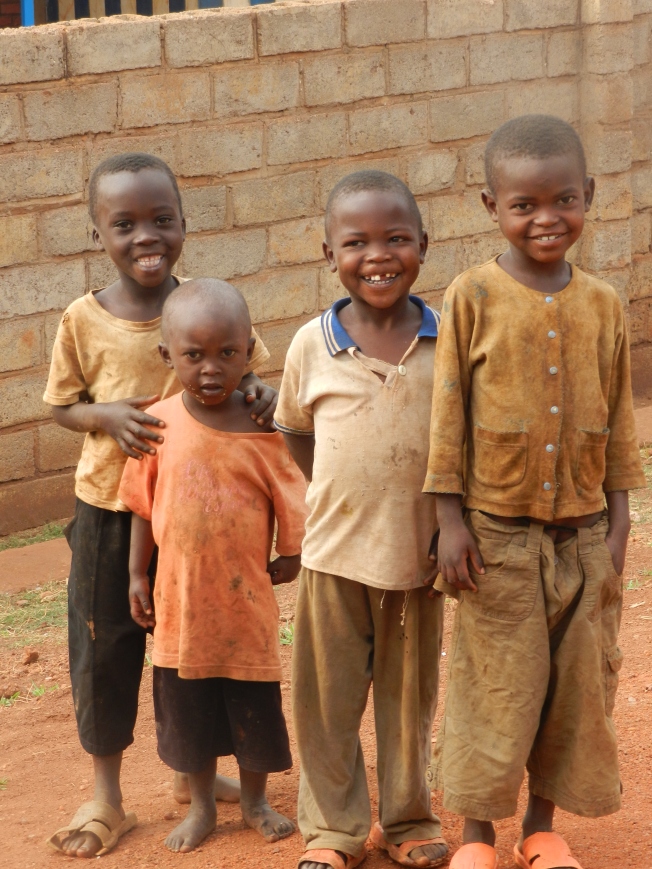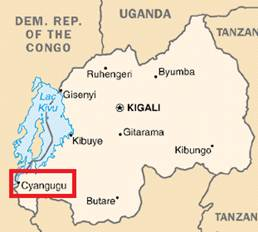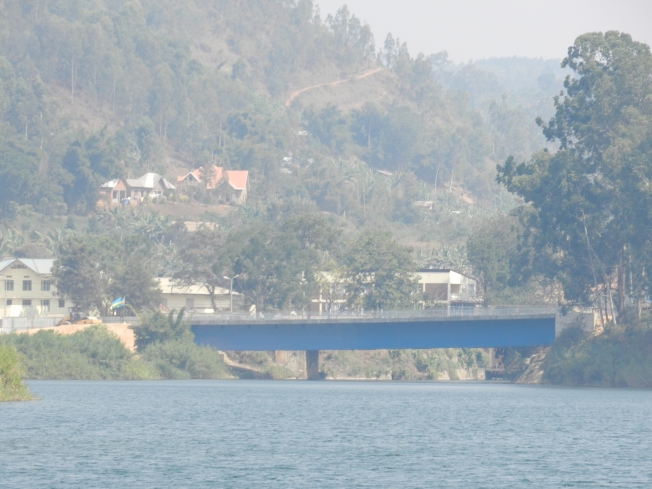Another year of GLOW camp is in the books! We gathered 85 teenage girls, most from rural villages and very poor families, to learn about HIV/AIDS and malaria prevention, family planning, goal setting, and GIRL POWER! 🙂 GLOW (Girls Leading Our World) camp is always an amazing experience. The girls arrive on the first day of camp completely overwhelmed, shy and timid like many Rwandese girls, and leave four days later completely energized and confident. So many aspects of Peace Corps are all about doing the work to lay the foundation but you don’t get to see the results in the short 27-months of your service. GLOW camp is a great exception. You get to watch the transformation of the girls with your own eyes, observe as their confidence grows with every lesson and activity, and for those five days everything else in the world seems to melt away. I attended camp in the East this year, which is not where I live, but it worked out well since I was able to share a Hero Group with my awesome friend, Heather. There were ten hero groups and our inspirational woman was Jeannette Kagame (she is married to Paul Kagame- the president of Rwanda) so we had lots of fun with our decorations and name tags. Jeannette is the founder of the Imbuto Foundation, an organization that provides services and support for many of the vulnerable populations in Rwanda like people living with HIV/AIDS and children who cannot afford school fees. Imbuto is the Kinyarwanda word for seed, but it is also the word for fruit, and we drew inspiration from the latter to construct our name tags. To tell you the truth Heather chose the symbol- that girl loves her bananas.
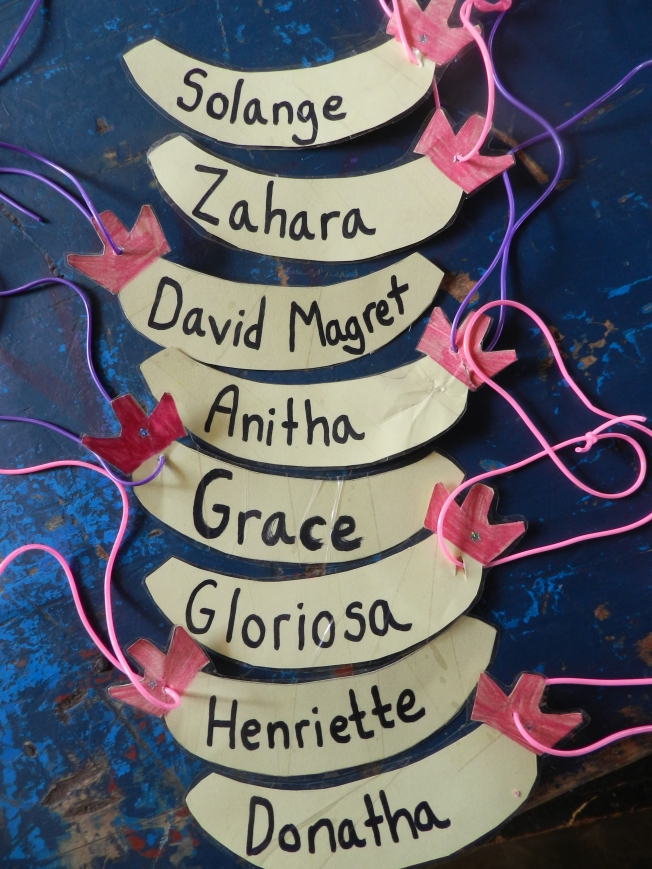
When the girls first arrived they took a quick pre-test (monitoring and evaluation is a necessary component if you want grant money) and then decorated their journals with images from magazines. They love cutting out white girls and plastering their covers with a mosaic of white faces from glossy magazines. Kind of creepy in my opinion, but to each his own- they seemed quite happy with their work. You can see in the picture below that each girl has a piece of fabric and that helped to identify which Hero Group they belonged to for the duration of the camp. Every day they could choose how to incorporate their fabric into their outfit so some wore it as a hair accessory while others opted to construct a belt or scarf.
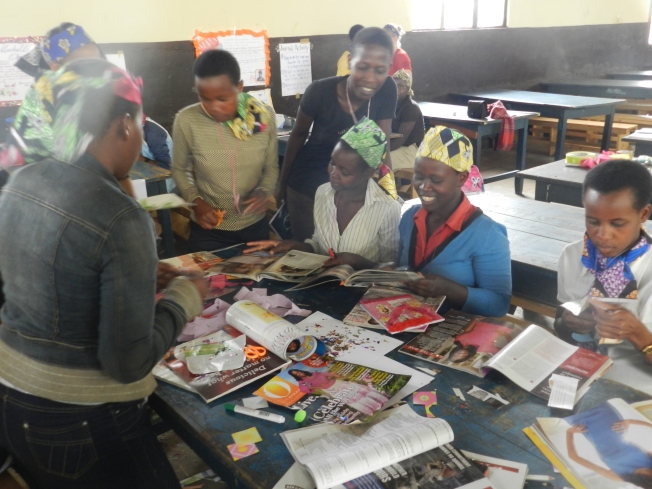
For most of the meals we sat with our Hero Groups, and although the Kagame group was small, we had lots of energy and had cheers about bananas in three different languages. I am not sure any group could top that accomplishment. The food was good but pretty basic and never changed much. Breakfast was bread and tea (and porridge for the girls) while lunch and dinner consisted of beans and cabbage served over one of three carbohydrates- potatoes, rice, or plantains. When I traveled home at the end of camp I stopped in Kigali to get a big salad since it had been a week without anything green on my plate! Here are the Kagame girls enjoying their dinner together the first night:

Every day the girls had three lessons an each day had a theme, like HIV/AIDS or self-confidence and girl power, and all three lessons corresponded to this theme. On the first day they had a big discussion about gender equality, which was pretty interesting to observe. Gender equality is a term that most Rwandese people know but I think very few people really understand what it means outside the context of regurgitating words announced on the radio. Rwanda is making great strides to introduce a culture of gender equality but, like everything here, it is process that goes buhoro, buhoro- slowly, slowly. The girls worked in small groups to discuss gender roles in Rwanda, the notion of gender equality, and how to promote the idea in their villages.

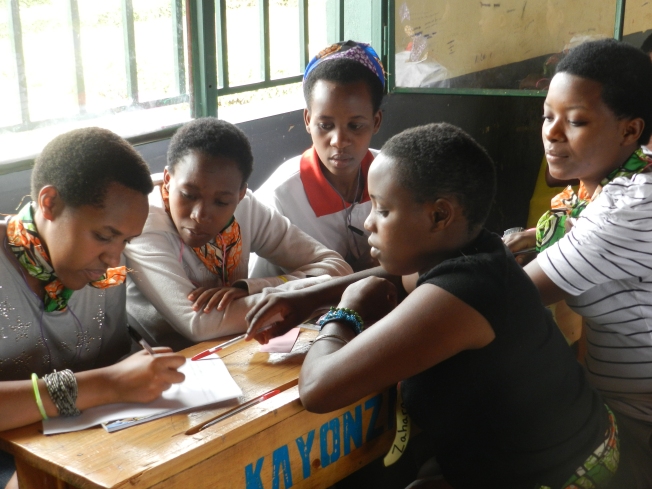
One of the activities was to draw a visual depiction of what they saw as examples of gender inequality in Rwanda. In the first image you can see the mother is at home cooking with a baby on her back while the husband is shown in a chair drinking out of a gourd full of locally brewed banana beer. In the second half of the drawing they show how the couple could share chores, the mama sweeping and the father cooking.
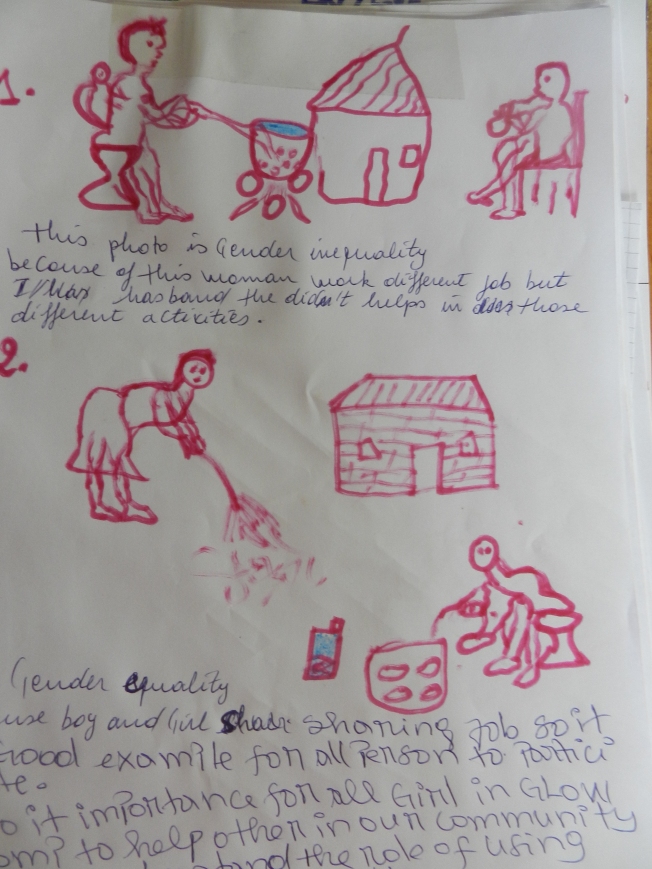
I thought this was a particularly clever drawing that was done by my favorite camper, Smayah.

Every afternoon, after the last lesson, there was a time allotted for afternoon activities. They could choose between a variety of sports like volleyball, soccer, or frisbee, and other cool options like crafting, dance lessons, and even a class on the science of cooking. Heather and I taught baseball, and although it it was not a super popular option, we did manage to convince three girls to come give it a try and they seemed to really enjoy it! As it turns out, baseball is tricky to play with five people, so we eventually moved on and I went to check out the crafting room. Crafting actually meant beading, actual crafts, and nail polish- I think you can imagine it was slightly more alluring than swinging a piece of wood at a ball I was throwing near their faces.

As I mentioned before, our group was small but mighty! We had the smallest amount of campers but tons of camp spirit and the other groups were often treated to a variety of lovely cheers and songs, frequently centered around our symbol- the banana. Here is a picture of our group after we constructed a large banana out of paper and yellow rope. Working in a country that leaves you in a constant state of lacking resources really does foster creativity! 🙂

The picture below is from a lesson on the science behind HIV and AIDS when the girls played the “lion and elephant” game. One girl is selected to be the baby elephant and stands in the middle of the room. We selected the smallest girl at the camp, Angel, and she played the role beautifully. Then Ian, the PCV teaching the lesson, picked five girls to be the adult elephants who stood around the baby elephant to protect her from predators. Then Ian chose three girls to be the lions, who had the job of trying to attack the baby elephant. This photo shows the first attempted attack when all the adult elephants were still present and successfully protected the baby from the lions. After this the girls had to identify what each animal represented. The baby elephant is the the human body, and the adults are the immune system. Most of the girls guessed that the lions represented HIV or AIDS, but they were actually illnesses and infections trying to attack the body. Then Ian reveals that he was representing HIV and proceeded to “kill off” a few of the adult elephants, leaving the baby much more vulnerable to attacks. Each lion was told a disease or illness that they represented like tuberculosis, malaria, or diarrhea in order to show the girls that even something that has a simple cure can kill a person with a compromised immune system. They learned some facts and had fun playing an active game- double win! 🙂

One day the girls had lessons about family planning and safe sex. I think it was awkward for some girls but as a group they had TONS of questions and I was a bit horrified by some of the popular myths that are perpetuated in this culture when it comes to sex. In America, when a teenager wants to learn about sex, they have many (probably too many) ways to research the topic. In Rwanda the girls believe what their friends or boyfriends tell them because they just don’t know any better. So when a boy tells her that he will die if they don’t have sex, or that the lubrication on condoms is best used for curing acne, the girl has to trust his word. We encourage all girls to study this topic because even if they choose to not have sex right now they can share their knowledge with other girls in their communities. There are way too many teen pregnancy situations in this county and even though abstinence is the ideal method for prevention the reality is that a lot of these girls have sex before marriage and need to learn how to be safe. The condom demonstration is always an interesting experience and the girl’s faces in this photo sum up nicely how many of the girls felt about the activity:
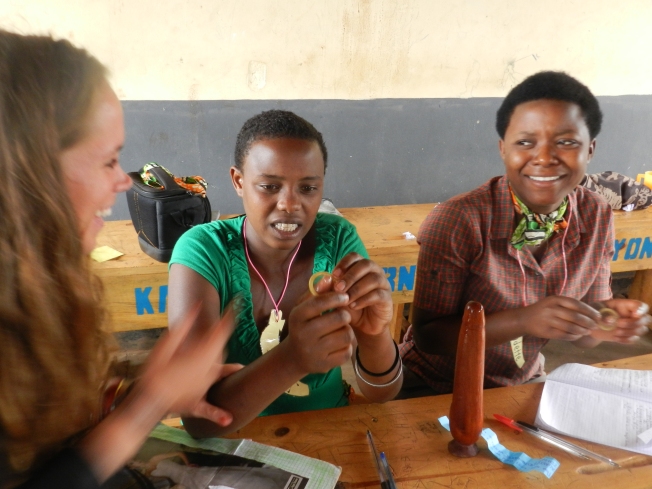
The picture below is a shot of my favorite camper, Smayah. She was a favorite for most of the PCVs but I was kind of the head of her fan club. I had a long conversation about her family the first day and she told me how there are 15 (yes fifteen) kids in her family and her dad died when she was five. Her mother has raised them alone ever since and sometimes struggles with all the responsibilities. She wants to be “a journalist and business woman” when she finishes studying and I have not a doubt in my mind that she will accomplish whatever she sets her mind too. Smayah was extremely intelligent and articulate but also compassionate and sensitive. She would often braid my hair for me in the mornings and made me a pair of earrings in crafts one day since I had forgotten to put in a pair that day. Since our camp ran during the end of Ramadan she couldn’t eat during the day and sometimes had to miss parts of activities to pray yet never once complained. She and another girl woke up every day at 3:30 am to eat a small breakfast in the dark and then didn’t eat again until 6:30 pm, after a full day of lessons and activities. This didn’t faze her in the least. She never sat out and even participated in sports one day- such a strong girl. On the last day many of the girl were excited to return home but Smayah cried and cried. She is one of the girls who is just a genuinely amazing person and I have so much respect for all of her hard work, and one day when she is a BBC correspondent I will track her down for an autograph.

One night we had an “I can’t bonfire.” Each girl wrote down something that someone once told them they couldn’t do and, after reading their statement to the group, they threw the paper in the fire, destroying the negative words and embracing the praise and encouragement from the other girls. It was a really inspiring activity and hopefully an empowering experience for the girls since they live in a culture that tells them “no” a lot of the time. After this the girls tasted s’mores for the first time. I cautioned the first girl to hold the stick with her marshmellow above the flames and she immediately proceeded to thrust her poor mellows into the belly of the fire and they of course came out a gooey blob of sugar on fire. I blew out the flames, she smashed to goo in with the chocolate between two crackers, and I imagine it tasted just fine given the rate at which she consumed her final product. After s’mores we had a big dance party under the stars. No speakers, just us singing a mixture of modern pop songs and traditional songs and hymns in Kinyarwanda. This was perhaps my favorite experience of camp. At one point a girl came to feed me a bite of her s’more (which I of course accepted- wouldn’t want to be rude after all) and then she gave me a big hug and said, “I love you sooo much, Suzanna.” A perfect night indeed. Chocolate, dancing under the open sky, and lots of hugs and cute comments from awesome girls.
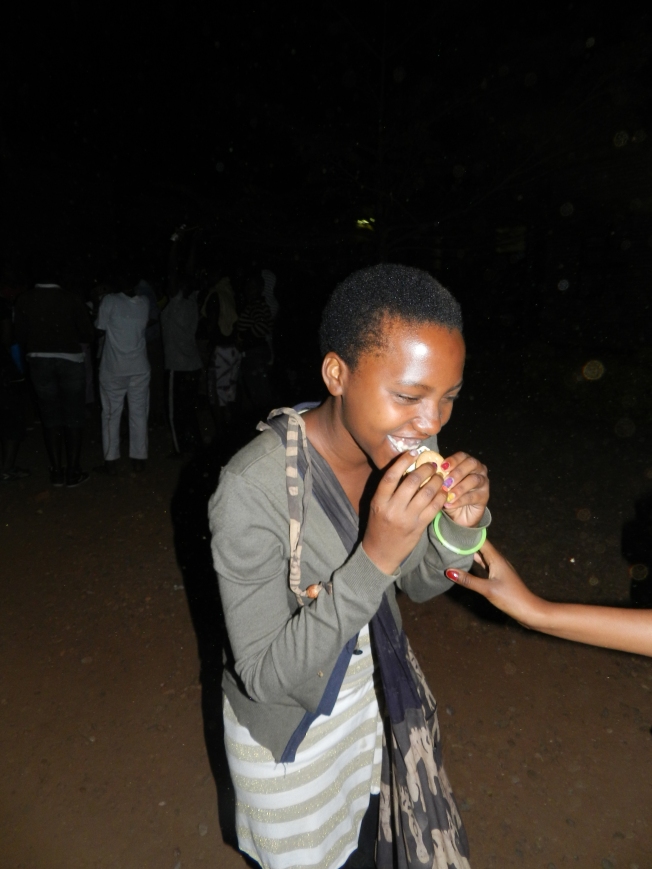
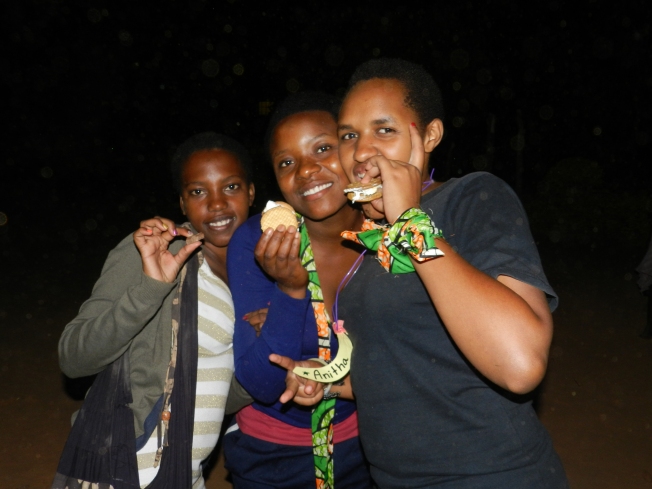
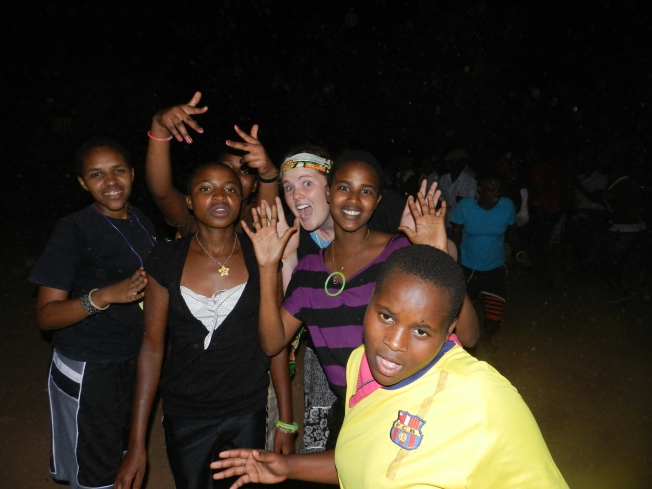
There was also a field day event that was pretty awesome. They competed in three events: three-legged race, tug-of-war, and the dizzy bat race that made me feel sick just watching. We competed the whole time against team Obama and, although we dominated the first race, it was sadly our one and only win of the day.

Here are the girls right before the tug-of-war competition. Looking oh-so cute and excited, confident that even with our small numbers we stand a chance. Little did we know…

That we would get absolutely dominated. It was ugly. All of the girls ended up on the ground, and even though Heather was allowed to compete since our team was so small her fate was not so pleasant.
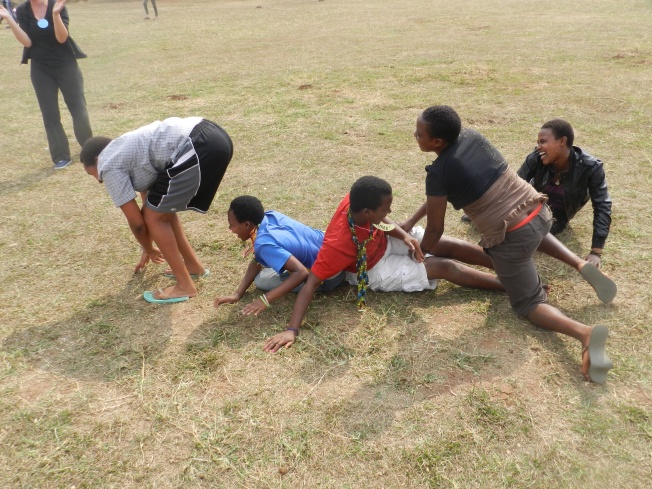
Here is a shot of Heather after she got pulled along the ground for a solid ten feet when she didn’t let go. Now that is commitment. Well played team Obama, well played.

After we lost three times in a row we decided to use the rope in a new capacity to foster a friendly activity between the girls. They enjoyed the game but didn’t understand right away that the jumping rope part wasn’t a competition so they would yell at anyone who messed up, which was a little intense for a school-yard game. This is a shot of Divine, Heather’s very best friend from site, showing the girls how it’s done. 🙂
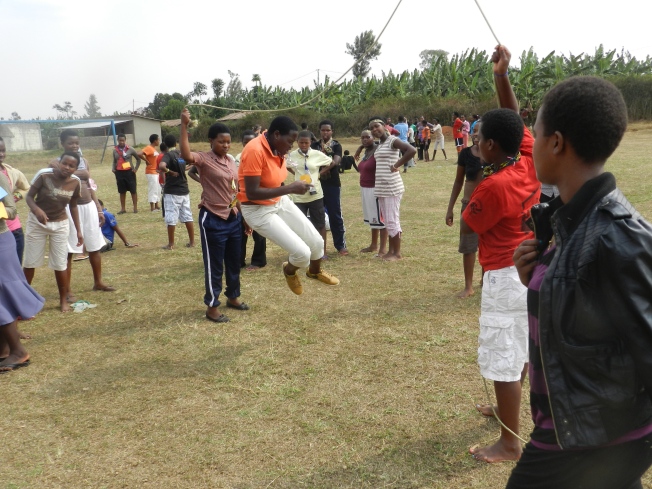
During the dizzy bat competition, which Obama also dominated, I had the opportunity to observe a few tug-of-war matches and it made me feel better to see that one team almost always ended up like this:
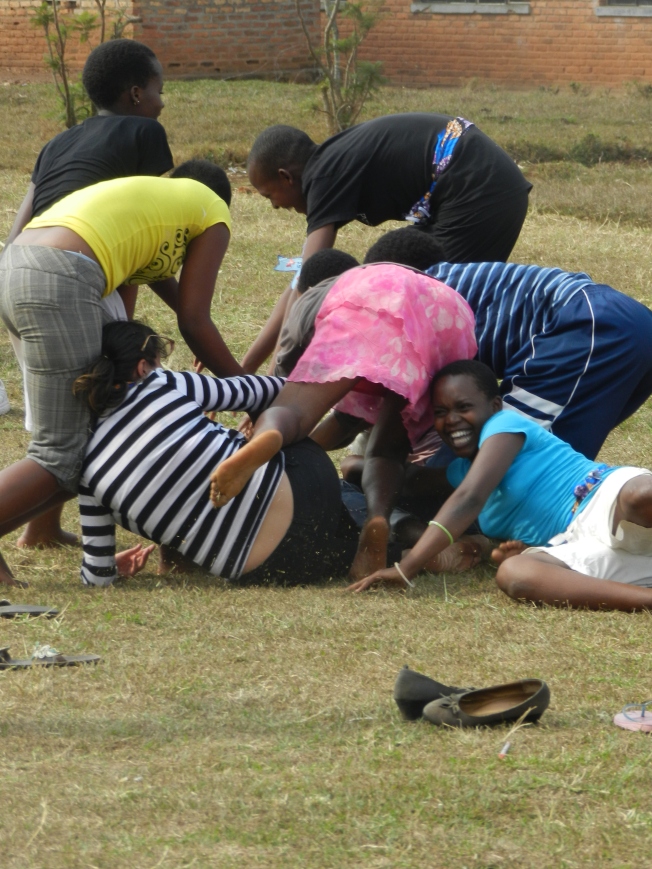
We also had quite a few people show up to watch despite the fact that I can’t for the life of me remember sending them invitations to GLOW camp. A fence in Rwanda can mean “stay out” or also “please crawl through me.” I do believe the second translation is the most frequently adopted protocol, especially when foreigners are on the other side!
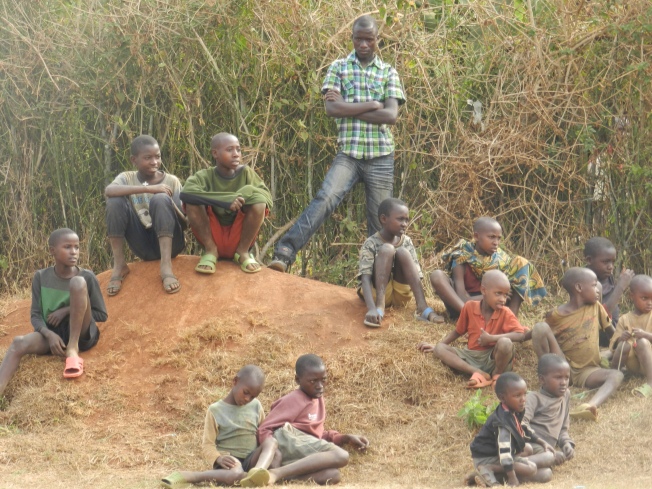
The camp had 75 campers and 10 junior facilitators (JR’s). The JR’s were all campers last year who were selected to come again in more of a leadership role this year. One of their responsibilities was to attend a daily class on malaria prevention and then teach that lesson to their Hero Group. There were mosquito nets hanging from trees and thrown over lunch tables during lessons, and every girl even got to take one home for her family.
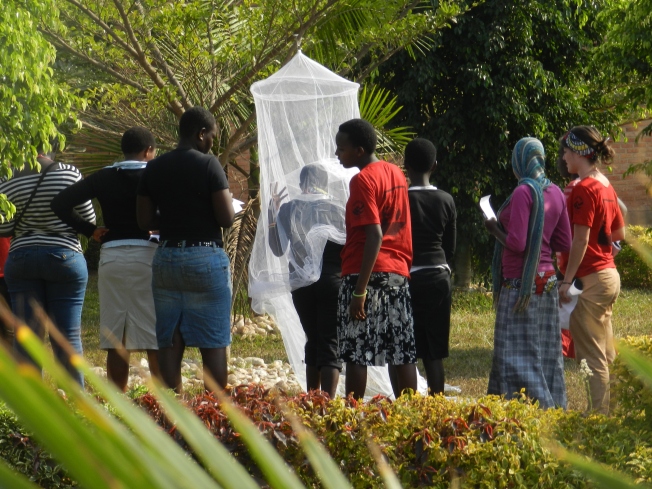
A shot of the Kagame cuties hanging out under our mosquito net:
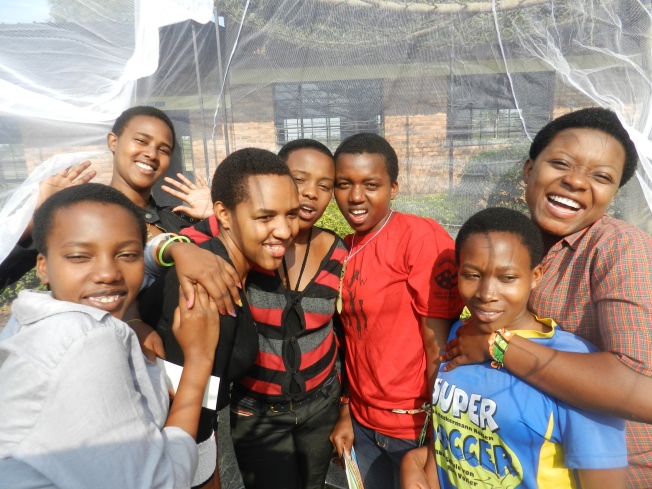
At the end of camp Heather led all the girls and facilitators in a trust sit. It stated out looking pretty good:

But then the circle had some issues with structural integrity…
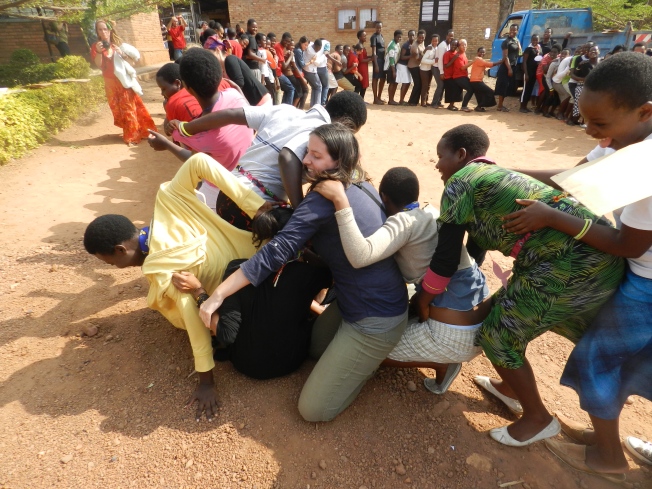
But practice makes perfect! Love to see all of those beautiful smiles! 🙂

The last activity was a closing ceremony and each group was able to dance around the stage and preform their cheers for everyone. Our Kagame girls nailed their performance and did Jeannette, and bananas, proud. The last exercise was showing the girls how their knowledge can spread and be a powerful tool in their communities when it comes to issues like gender equality, disease prevention, and family planning. Mike, the PCV leading the session, lit his candle and then in a few minutes the whole room was full of burning candles, representing the powerful knowledge that these girls cans spread in an effort to build a brighter future for women, and all people, in Rwanda. What a beautiful way to end an amazing camp!!!




